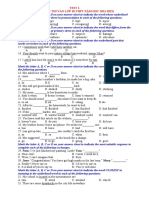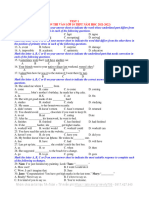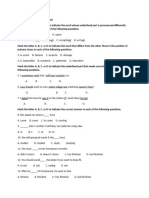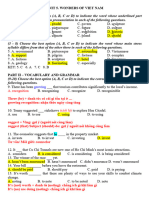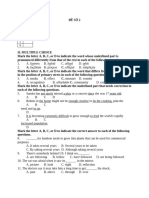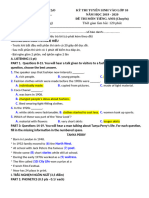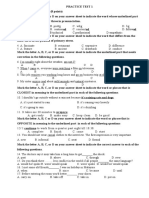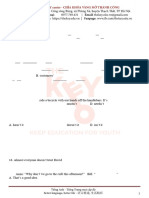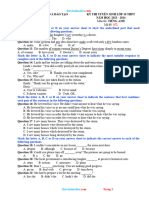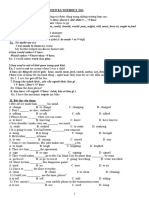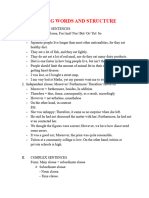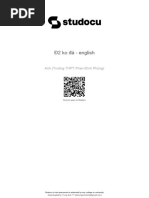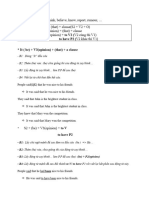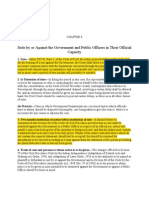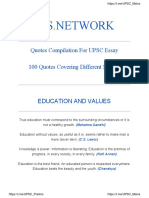0 ratings0% found this document useful (0 votes)
Key Test 1 Reading
Key Test 1 Reading
Uploaded by
anhanhyp1Copyright:
© All Rights Reserved
Available Formats
Download as DOCX, PDF, TXT or read online from Scribd
Download as docx, pdf, or txt
Key Test 1 Reading
Key Test 1 Reading
Uploaded by
anhanhyp10 ratings0% found this document useful (0 votes)
Copyright
© © All Rights Reserved
Available Formats
DOCX, PDF, TXT or read online from Scribd
Share this document
Did you find this document useful?
Is this content inappropriate?
Copyright:
© All Rights Reserved
Available Formats
Download as DOCX, PDF, TXT or read online from Scribd
Download as docx, pdf, or txt
0 ratings0% found this document useful (0 votes)
Key Test 1 Reading
Key Test 1 Reading
Uploaded by
anhanhyp1Copyright:
© All Rights Reserved
Available Formats
Download as DOCX, PDF, TXT or read online from Scribd
Download as docx, pdf, or txt
You are on page 1/ 4
Mark the letter A, B, C or D on your answer sheet to indicate the word
CLOSEST in meaning to the underlined word in each of the following questions.
31. His school is located in the mountainous are
A. lain B. stood C. situated D. stayed
32. There are some drawbacks in the city life nowadays.
(advantages and disadvantages = pros and cons)
A. bad B. advantage C. good D. disadvantages
B. Mark the letter A, B, C or D on your answer sheet to indicate the word(s)
OPPOSITE in meaning to the underlined word(s) in each of the following
questions.
33. The church is quite an ancient= old= historic building.
A. old B. fresh C. historic D. modern
34. She’s been trying to find a good job in the city and she’s finally succeeded in V-
ing = managed to V= make progress.
A. stopped B. failed C. lost D. managed
Mark the letter A, B, C or D on your answer sheet to indicate the underlined part
that
needs correction in each of the following questions.
15. I sometimes wish that I will have=> would/could have another car.
A B C D
16. Your friends went to your native village last weekend, weren’t they =>didn’t
they?
A B C D
17. I asked him how far was it to the station if I went there by taxi.
A B C D
Read the following passage and mark the letter A, B, C, or D on your answer
sheet to indicate the correct word or phrase that best fits each of the numbered
blanks.
Over the last century, there have been many significant changes in the way we
live. Obviously, it is difficult to (35) ………. the life of ancient people and the life of
the people living in the twenty- first century because so many changes have occurred.
Even the changes that have (36) ...… over the last ten years are amazing.
People in the past were not (37) ………… to travel so long distance within such a
short period of time. Nowadays, we have become very mobile=flexible. We have fast
and comfortable cars. In addition, more and more people travel by plane. Moreover, in
the past people had to work harder as=because=since they did not have (38) ………
and machine(n) to make their work easier.
35. A. compare st AND/WITH st B. suppose C. predict: dự đoán D. discuss
36. A. considered B. expressed C. occurred= happen=take place: xảy
ra, diễn, tổ chức D. arranged
37. A. capable B. able to V= can V: có thể, có khả năng lgi C.
might D. use
38. A. rules B. ideas C. tools D. teams
Read the following passage and mark the letter A, B, C, or D on your answer
sheet to indicate the correct answer to each of the questions.
Package holidays, covering a two weeks stay in an attractive location are
increasingly popular, because they offer an inclusive:bao gồm price with few extras.
Once you get to=go to the airport, it is up to the tour operator to see(be up to sb to
v:giao trách nhiệm cho ai làm gì= be down to sb= be responsible for V_ing) that you
get safely to your destination. Excursions, local entertainment, swimming, sunbathing,
skiing - you name it – it’s all laid on for you. There is, in fact, no reason for you to
bother anything yourselves. You make friends and have a good time, but there is very
little chance=opportunity that you will really get to know the local people. This is
even less likely on a coach tour, when you spend almost your entire time travelling.
Of course, there are carefully scheduled stops for you to visit historic buildings and
monuments, but you will probably be allowed only a brief stay overnight in some
famous city, with a polite reminder to be up and breakfasted early in time for the
coach next morning. You may visit the beautiful, the historic, the ancient, but time is
always at your elbow. There is also the added disadvantage of being obliged to
spend(obligate sb to V:ép buộc, bắt buộc ai đó làm gì) your holiday with a group of
people you have never met before, may not like and have no reasonable excuse for
getting away from. As against this, it can be argued that for many people, particularly
the lonely or elderly, the feeling of belonging to a group, although for a short period
on holiday, is an added bonus. They can sit safely back in their seat and watch the
world go by:in the past/in space or time.
(Excuse for: forgive sb/st; allow sb not to do st or attend st) argue with sb= have break
up with sb;argue about st; argue for V_ing: phản đối làm gì
39. In spite of its disadvantages, spending a holiday with a group is particularly good
for ____ .
A. schoolboys and schoolgirls B. the lonely or elderly people(As against
this, it can be argued that for many people, particularly the lonely or elderly)
C. newly married young couples D. those who always travel by themselves
40. "Time is always at your elbow=." This means ___________________ . (will
probably be allowed only a brief stay overnigh)
A. your time always is limited when visiting a place
B. your time is always limited when visiting a place
C. you can take your time visiting a place(take + tgian + V_ing=spend time to V)
D. you can take your time visiting a place
41. When you go on a package holiday, you don’t have to__________ .(EXCEPT)
A. Arrange:sắp xếp anything yourself ( in time for the coach)
B. pay for:thanh toán, chi trả cho cgi any extra activities
C. follow the tour schedules D. travel in an organized group(your holiday with
a group of people you have never met before,)
42. Which of the following statements is NOT true?
A. A coach tour is always exhausting.
B. You are constantly on the move when you are on a coach tour. (almost your entire
time travelling.)
C. You get no chance to visit historic buildings in famous cities on a coach tour.
(Of course, there are carefully scheduled stops for you to visit historic buildings and
monuments,)
D. You don’t get enough sleep on a coach tour. (will probably be allowed only a brief
stay overnigh)
Mark letter A, B, C or D on your answer sheet to indicate the sentence that is
closest in
meaning to the original sentence in each of the following questions.
43. Study hard or you will fail the exam. => if 1
A. You don’t fail the exam unless you study hard.
B. If you don’t study hard, you will fail the exam./ if you study hard, you won’t
fail the exam.
C. You don’t study hard, so you will fail the exam.
D. Because you study hard, you don’t fail the exam.
44. My school has no playground equipment or extra activities.
A. I wish my school had had playground equipment or extra activities.
B. I wish my school had playground equipment or extra activities.
C. I wish my school can have playground equipment or extra activities.
D. I wish my school will have playground equipment or extra activities.
((wish(future):would/could))
45. Children are allowed to have a voice in decision making in the family. We are
pleased about that.
A. We are pleased about children are allowed to have a voice in decision making in
the family.
B. We are pleased that children are allowed to have a voice in decision making in
the family.
C. We are pleased that children allowed to have a voice in decision making in the
family.
D. We are pleased for children to be allowed to have a voice in decision making in the
family.
46. Although his leg was broken, he managed to=success in getting) get out of the
car.
A. In spite his broken leg, he managed to get out of the car.
B. In spite of his broken leg, he managed to get out of the car.
C. In spite his leg broken, he managed to get out of the car.
D. In spite of his leg was broken, he managed to get out of the car.
47. They reported that the troops were coming. It (be) + DTTT
A. It had been reported that the troops were coming.
B. It was being reported that the troops were coming.
C. It was reported that the troops to be coming.
D. It was reported that the troops were coming.
48. “What time did you come home last night, Mark?” said Tom. (qkđ->qkđ
hoặc qkht)
S + đttt + w_h word + S+ V(lùi thì)
đổi ngôi/tân; lùi thì; đổi trạng từ chỉ tgian
A. Tom asked Mark what time had he come home the previous night.
B. Tom asked Mark what time he had come home last night.
C. Tom asked Mark what time he came home last night.
D. Tom asked Mark what time he had come home the previous night.
49. Did you always eat(V) sweets when you were small? (always: hiện tại_luôn luôn,
thường xuyên làm gì HTAI; quá khứ_thường làm gì ở quá khứ; be always + V_ing(httd): thái
độ khó chịu về việc làm nào đó)
A. Were you use to eat sweets when you were small?
B. Did you used to eat sweets when you were small?
C. Were you used to eat sweets when you were small?
D. Did you use to eat sweets when you were small?
50. We last visited Ho Chi Minh city 3 years ago(qkđ).
Since: kể từ khi, for: được bnhieu tgian, before, recently, already, just
A. We didn’t visit Ho Chi Minh city for 3 years.
B. We haven’t visited Ho Chi Minh city for 3 years.
C. We haven’t visited Ho Chi Minh city for 3 years ago.
D. We didn’t visit Ho Chi Minh city for 3 years ago.
You might also like
- Ection Istening Rogess Test Arket Leader PRE IntermediateNo ratings yetEction Istening Rogess Test Arket Leader PRE Intermediate5 pages
- English Word Exercises (Part 3): Multiple-choice Tests: English Worksheets, #3From EverandEnglish Word Exercises (Part 3): Multiple-choice Tests: English Worksheets, #35/5 (1)
- What Are The Interrelationships of NUTRITION, FOOD SCIENCE, AND CULINARY?No ratings yetWhat Are The Interrelationships of NUTRITION, FOOD SCIENCE, AND CULINARY?2 pages
- 20 đề luyện thi vào lớp 10 môn tiếng anh 2022No ratings yet20 đề luyện thi vào lớp 10 môn tiếng anh 202267 pages
- 20 đề luyện thi vào lớp 10 môn tiếng anh 2022No ratings yet20 đề luyện thi vào lớp 10 môn tiếng anh 202271 pages
- BTVN - 01. PRACTICE TEST 001.2020 - HandoutNo ratings yetBTVN - 01. PRACTICE TEST 001.2020 - Handout4 pages
- Đề Thi Thử Vào 10 - Môn Anh 9 - Tham Khảo ÔN Thi - Cộng Đồng Ôn ThiNo ratings yetĐề Thi Thử Vào 10 - Môn Anh 9 - Tham Khảo ÔN Thi - Cộng Đồng Ôn Thi7 pages
- Unit 5. Wonders of Viet Nam Part I - Phonetics: GrowingNo ratings yetUnit 5. Wonders of Viet Nam Part I - Phonetics: Growing5 pages
- Test 1 (Bộ Đề Ôn Thi Vào Lớp 10 Thpt Năm Học 2021-2022)No ratings yetTest 1 (Bộ Đề Ôn Thi Vào Lớp 10 Thpt Năm Học 2021-2022)10 pages
- thuvienhoclieu.com-De-TS-Tieng-Anh-10-Bac-Ninh-23-24No ratings yetthuvienhoclieu.com-De-TS-Tieng-Anh-10-Bac-Ninh-23-244 pages
- Đề Thi Thử Tuyển Sinh Lớp 10 Trung Học Phổ ThôngNo ratings yetĐề Thi Thử Tuyển Sinh Lớp 10 Trung Học Phổ Thông4 pages
- File - 20220604 - 101601 - Đề Thi Số 46 KeyNo ratings yetFile - 20220604 - 101601 - Đề Thi Số 46 Key10 pages
- 20 Đề Luyện Thi Vào Lớp 10 Môn Tiếng Anh 2022No ratings yet20 Đề Luyện Thi Vào Lớp 10 Môn Tiếng Anh 2022185 pages
- 20 đề luyện thi vào lớp 10 môn tiếng anh 2022No ratings yet20 đề luyện thi vào lớp 10 môn tiếng anh 2022186 pages
- Sushanto Paul English Note Compile All Part With AnswerNo ratings yetSushanto Paul English Note Compile All Part With Answer106 pages
- de-thi-hoc-ki-1-tieng-anh-9-global-success-de-so-3-1733380720No ratings yetde-thi-hoc-ki-1-tieng-anh-9-global-success-de-so-3-17333807207 pages
- Đáp Án Đề Dự Phòng Anh 9 Hkii 22-23No ratings yetĐáp Án Đề Dự Phòng Anh 9 Hkii 22-234 pages
- Tra: 1. There's An Extensive - of Artefacts Tracing Viet Nam's HistoryNo ratings yetTra: 1. There's An Extensive - of Artefacts Tracing Viet Nam's History5 pages
- De Thi Hoc Ki 1 Tieng Anh 9 Global Success de So 3 1733380716No ratings yetDe Thi Hoc Ki 1 Tieng Anh 9 Global Success de So 3 173338071624 pages
- Tra: 1. There's An Extensive - of Artefacts Tracing Viet Nam's HistoryNo ratings yetTra: 1. There's An Extensive - of Artefacts Tracing Viet Nam's History8 pages
- Bài tập Global Success 9 (Mai Lan Hương _ Hà Thanh Uyên) 6.2. TEST YOURSELF 2.docxNo ratings yetBài tập Global Success 9 (Mai Lan Hương _ Hà Thanh Uyên) 6.2. TEST YOURSELF 2.docx8 pages
- Category (23) - Drilling of Shallow Oil/Water Wells, Workover and Ancillary ServicesNo ratings yetCategory (23) - Drilling of Shallow Oil/Water Wells, Workover and Ancillary Services4 pages
- A Psychological Map of Love Alain de Botton's Love Stories As Reflections of Sternberg's Theory On LoveNo ratings yetA Psychological Map of Love Alain de Botton's Love Stories As Reflections of Sternberg's Theory On Love15 pages
- Sany HBT8018C-5S (T3) Trailer Pump - 004118No ratings yetSany HBT8018C-5S (T3) Trailer Pump - 0041182 pages
- Process Tracing of Extensive and Intensive Processes: Tulia G. FalletiNo ratings yetProcess Tracing of Extensive and Intensive Processes: Tulia G. Falleti9 pages
- Mobility Load Balancing (5G RAN6.1 - Draft A)No ratings yetMobility Load Balancing (5G RAN6.1 - Draft A)132 pages
- Suits by or Against The Government (India)No ratings yetSuits by or Against The Government (India)9 pages
- United States v. Torres-Leal, 10th Cir. (2010)No ratings yetUnited States v. Torres-Leal, 10th Cir. (2010)13 pages
- Quotes Compilation For UPSC Essay 100 Quotes Covering Different SectorsNo ratings yetQuotes Compilation For UPSC Essay 100 Quotes Covering Different Sectors18 pages
- What Is Culture? - Material and Nonmaterial CultureNo ratings yetWhat Is Culture? - Material and Nonmaterial Culture2 pages
- SAP at Accenture: Accenture's Own ERP Production Support ModelNo ratings yetSAP at Accenture: Accenture's Own ERP Production Support Model4 pages
- Ection Istening Rogess Test Arket Leader PRE IntermediateEction Istening Rogess Test Arket Leader PRE Intermediate
- English Word Exercises (Part 3): Multiple-choice Tests: English Worksheets, #3From EverandEnglish Word Exercises (Part 3): Multiple-choice Tests: English Worksheets, #3
- What Are The Interrelationships of NUTRITION, FOOD SCIENCE, AND CULINARY?What Are The Interrelationships of NUTRITION, FOOD SCIENCE, AND CULINARY?
- Đề Thi Thử Vào 10 - Môn Anh 9 - Tham Khảo ÔN Thi - Cộng Đồng Ôn ThiĐề Thi Thử Vào 10 - Môn Anh 9 - Tham Khảo ÔN Thi - Cộng Đồng Ôn Thi
- Unit 5. Wonders of Viet Nam Part I - Phonetics: GrowingUnit 5. Wonders of Viet Nam Part I - Phonetics: Growing
- Test 1 (Bộ Đề Ôn Thi Vào Lớp 10 Thpt Năm Học 2021-2022)Test 1 (Bộ Đề Ôn Thi Vào Lớp 10 Thpt Năm Học 2021-2022)
- thuvienhoclieu.com-De-TS-Tieng-Anh-10-Bac-Ninh-23-24thuvienhoclieu.com-De-TS-Tieng-Anh-10-Bac-Ninh-23-24
- Sushanto Paul English Note Compile All Part With AnswerSushanto Paul English Note Compile All Part With Answer
- de-thi-hoc-ki-1-tieng-anh-9-global-success-de-so-3-1733380720de-thi-hoc-ki-1-tieng-anh-9-global-success-de-so-3-1733380720
- Tra: 1. There's An Extensive - of Artefacts Tracing Viet Nam's HistoryTra: 1. There's An Extensive - of Artefacts Tracing Viet Nam's History
- De Thi Hoc Ki 1 Tieng Anh 9 Global Success de So 3 1733380716De Thi Hoc Ki 1 Tieng Anh 9 Global Success de So 3 1733380716
- Tra: 1. There's An Extensive - of Artefacts Tracing Viet Nam's HistoryTra: 1. There's An Extensive - of Artefacts Tracing Viet Nam's History
- Bài tập Global Success 9 (Mai Lan Hương _ Hà Thanh Uyên) 6.2. TEST YOURSELF 2.docxBài tập Global Success 9 (Mai Lan Hương _ Hà Thanh Uyên) 6.2. TEST YOURSELF 2.docx
- Category (23) - Drilling of Shallow Oil/Water Wells, Workover and Ancillary ServicesCategory (23) - Drilling of Shallow Oil/Water Wells, Workover and Ancillary Services
- A Psychological Map of Love Alain de Botton's Love Stories As Reflections of Sternberg's Theory On LoveA Psychological Map of Love Alain de Botton's Love Stories As Reflections of Sternberg's Theory On Love
- Process Tracing of Extensive and Intensive Processes: Tulia G. FalletiProcess Tracing of Extensive and Intensive Processes: Tulia G. Falleti
- Quotes Compilation For UPSC Essay 100 Quotes Covering Different SectorsQuotes Compilation For UPSC Essay 100 Quotes Covering Different Sectors
- What Is Culture? - Material and Nonmaterial CultureWhat Is Culture? - Material and Nonmaterial Culture
- SAP at Accenture: Accenture's Own ERP Production Support ModelSAP at Accenture: Accenture's Own ERP Production Support Model






